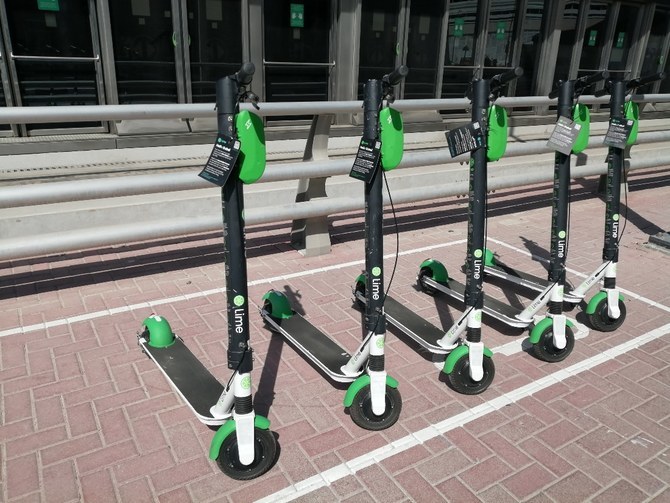
I recently narrowly escaped injury in Beirut in an incident with a motorbike that was traveling on the pavement. On top of that, I was verbally abused by the driver for not paying attention. In Paris, I was nearly hit by an electric scooter that was briefly cruising on the pavement to cut through the traffic. The rider did not even bother to apologize. In the new age of alternative transport, e-scooters and electric bicycles are causing chaos on the streets and the pavements, as well as becoming a health and safety hazard for pedestrians in most cities where private and rental e-scooters are operated.
In the age of all-electric alternatives to fossil fuel-powered vehicles, cities in the Western Hemisphere are preparing to rely solely on battery-powered means of transportation to ensure cleaner air, free from fossil fuel pollution, as part of the developed world’s rush to decarbonize their economies. But this is not happening smoothly, as providing the charging infrastructure for cars has proved costly for operators and consumers alike. And regulating the use of e-scooters is proving challenging on many fronts from a safety perspective, for their users and passers-by alike, but also from an aesthetic point of view, as for-hire bikes and e-scooters have become a nuisance, blocking pedestrian spaces and littering streets. They are often found abandoned in public parks or dumped in lakes, canals or rivers.
Against such a backdrop, Paris last month became the first city to vote to banish — and overwhelmingly so — rental e-scooters from its streets, delivering a blow to operators and a victory for road safety campaigners. The French capital had been an early adopter of for-hire e-scooters in 2018.
As the climate change clock ticks ever faster, we are constantly told that humanity is approaching its hour of reckoning if it does not rush to reduce emissions, transform its economies and change to a low-carbon footprint. France is working to meet a decarbonization target of 40 percent below its carbon emission levels of 1990 by 2030. The UK government claims to be working to lower its carbon footprint by 68 percent by 2030 and 78 percent by 2035. It hopes to reach net-zero emissions by 2050.
It is no surprise, therefore, that some half-baked options have been rolled out, with limited regulation, feasibility trials or safety considerations, such as in the case of e-scooters, whose widespread use has been implemented hastily, helping governments to tick more boxes regarding the provision of greener options.
Despite their utility to some — along with their nuisance and danger to many on our streets — these battery-operated means of transport have become killer machines, as some low-quality and not very cheap batteries have caught fire or exploded while charging. In the UK, e-bikes or e-scooters have caused a fire in London every two days on average since the start of this year. Across the UK, 190 people have been injured and eight killed due to fires sparked by e-scooters or e-bikes.
Paris will revoke the contracts of the city’s three official e-scooter rental operators in the summer.
Mohamed Chebaro
While London is still weighing up its options, Paris will revoke the contracts of the city’s three official e-scooter rental operators in the summer. Though hundreds of thousands of journeys are said to be completed each day in France on rented e-scooters, their business model is proving expensive, costing commuters €5 ($5.4) for every 10 minutes of use, which is seen as unsustainable even without the accidents involving pedestrians and exploding batteries associated with them.
The Paris ban might not dent France’s wide-ranging efforts to reach its emissions targets, but it could push other cities to follow suit and this might cause a significant financial and reputational blow for the multinational operators. In other cities, authorities have authorized the use of rental e-scooters on the condition that they adhere to stringent rules governing their use. Enforcement of the age of the users and the speed of the machines are challenging, such as in London, where the use of privately owned e-scooters on public roads is outlawed but is generally tolerated.
Clearly, the e-scooter is another manifestation of the rush to provide alternatives to old human addictions, such as cars and their internal combustion engines that have been heating our planet. E-scooters are the latest in a long list of efforts to find ways to reduce pollution and global warming, but which are indirectly posing new challenges. In their rush to meet emissions reduction targets, states have forsaken their primary roles of leading, legislating and enforcing compliance.
E-scooters are, no doubt, a great invention and, if used properly, could render a good service to society. But unless they are coupled with a behavioral and accountability tag, their practical use could be counterproductive to safety and order in society.
In the cities of the third world, this problem is far from registering on the priorities of the authorities, as polluting vehicles remain the king in public spaces, with cars, motorbikes and buses harmoniously living side by side with bicycles and e-scooters, along with all the adversities they cause their drivers and the public. In advanced cities, council authorities have been grappling with consumers’ new choices of getting from A to B, with cycle lanes, bus lanes and changes of the direction of travel requiring users of the public roads in those cities to complete a crash course to comprehend the color-coded lanes, direction arrows and road signs before they can safely cross the street.
• Mohamed Chebaro is a British-Lebanese journalist, media consultant and trainer with more than 25 years of experience covering war, terrorism, defense, current affairs and diplomacy.










